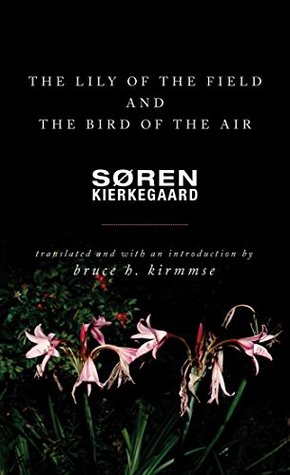More on this book
Kindle Notes & Highlights
Read between
February 24 - March 1, 2022
“Above all, do not lose your desire to walk … every day I walk myself into a state of well-being and walk away from every illness; I have walked myself into my best thoughts, and I know of no thought so burdensome that one cannot walk away from it.”15
You shall in the deepest sense make yourself nothing, become nothing before God, learn to keep silent. In this silence is the beginning, which is first to seek God’s kingdom.
The bird keeps silent and waits: it knows, or rather it fully and firmly believes, that everything takes place at its appointed time.
And this is surely the misfortune in the lives of many, of far the greater part of humanity: that they never perceived “the moment,” that in their lives the eternal and the temporal were exclusively separated. And why? Because they could not keep silent.
And even if what you suffered in the world were as agonizing as anything ever experienced, you shall acknowledge the lily and the bird as your teachers and not become more important to yourself than the lily and the bird are to themselves in their little cares.
This is how it is with the gospel. The most important thing for the gospel is not to reprimand and scold; what is most important for the gospel is to get human beings to follow its guidance.
God, who of course never dies, is even closer to you, infinitely closer, than two lovers are to one another—he, your Creator and Sustainer; he, in whom you live, move, and have your being; he, by the grace of whom you have everything.
It is said that in learning to obey one learns to rule, but what is even more certain is that by being obedient oneself one can teach obedience.
When the bird comes into contact with the harshness of this life, when it is tried with difficulties and opposition, when, every morning, day after day, it finds that its nest has been disturbed: every day, the obedient bird begins its work all over again with the same joy and meticulousness it displayed the first time. In simple fashion and with the help of unconditional obedience, it understands one thing, but understands it unconditionally: that this is its work and that it is solely concerned with doing it.—When the bird must experience the world’s evil, when the little songbird that sings
...more
joy is communicative, and therefore no one teaches joy better than a person who is joyful himself.
What joy, when the dew falls and refreshes the lily, which has now cooled off and prepares to rest; what joy, when after its bath the lily sensually dries itself in the first ray of sunlight; and what joy, the long summer day! Ah, just consider them. Consider the lily; consider the bird; and look at them together! What joy, when the bird hides behind the lily, where it has its nest and where it is so indescribably cozy, while it passes the time in jesting and bantering with the lily! What joy when high up from the branch, or higher up, all the way up in the cloud, the bird blissfully keeps its
...more
But a person who is joy itself is unconditionally joyful, just as, conversely, the person who is unconditionally joyful is joy itself. Oh, the conditions for becoming joyful cause us human beings much trouble and concern—even if all the conditions were fulfilled, we perhaps would not become unconditionally joyful anyway.
But their instruction in joy, which is in turn expressed by their lives, is quite briefly as follows: There is a today; it is. Indeed, an infinite emphasis is placed upon this is. There is a today—and there is no worry, absolutely none, about tomorrow or the day after tomorrow.
Thus, that you came into existence, that you exist, that “today” you receive the necessities of existence, that you came into existence, that you became a human being, that you can see—consider this: that you can see, that you can hear, that you have a sense of smell, that you have a sense of taste, that you can feel; that the sun shines for you and for your sake, that when it becomes weary, the moon begins to shine and the stars are lit; that it becomes winter, that all of nature disguises itself, pretends to be a stranger—and does so in order to delight you; that spring comes, that birds
...more


